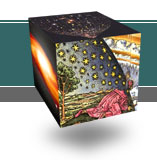2001 - 2003: University of California
- Santa Barbara
Science, Religion and the Human Experience
Abstract
2002-2003 Lectures and Activities
2001-2002 Lectures and Activities
2000-2001 Lectures and Actvities
Project Leader
Organizing Committee/Working Group
Additional Information
Abstract
Science and religion are two major forces shaping our world. How do they relate
to each other? Some people think of science and religion as separate domains,
of reason versus faith, facts versus values, or an emphasis on the material
versus the spiritual world. Other people think of science and religion as overlapping
domains, marked either by warfare arising from conflicting claims, or harmony
arising from similar claims. Whether separate or overlapping, one important
and often neglected similarity is the human face of science and religion: both
operate in, yet seek to reach beyond, specific historical, political, ideological,
and psychological contexts defining the human experience. How may we understand
science and religion as arising from, yet somehow transcending, the human experience?
This question underlies the three-year Templeton Research Lectures program at
the University of California, Santa Barbara.
Considering science and religion in the context of the human experience calls
into question simple assertions of unity or disunity, but may lead to more possibilities
for fruitful exchange. The challenge and potential of introducing the human
experience into science-religion dialogue is analogous to the three-body problem
in celestial mechanics. The relative orbits of two celestial bodies are stable;
when a third body is introduced, however, the situation gets tremendously complex,
and is generally unpredictable, but much more interesting. The three-body problem
analogy suggests the possibility that the realities toward which science and
religion point, and the forms of human experience in which they are grounded,
all interrelate in complex and unpredictable ways.
Running from Spring 2001 to Spring 2003, "Science, Religion, and the Human
Experience" features a series of public, web-accessible lectures by a distinguished
group of scientists, religious leaders, and scholars of science and religion
in an effort to redefine grounds for their constructive engagement. Related
activities will include monthly faculty reading seminars and graduate and undergraduate
courses. The program ultimately aims to develop a long-term research and educational
focus in science and religion studies at UCSB.
top
2002-2003 Lectures and
Activities
February 6, 2003
Experiencing Evolution: Darwinism and the Diminution of Religious Belief
Ronald
Numbers, University of Wisconsin, Madison
March 6, 2003
Kabbalah and Contemporary Cosmology: Discovering the Resonances
Daniel
Matt, Shalom Hartman Institute, Jerusalem
April 17, 2003
Uneasy Alliances: The Faith Factor in Medicine; the Health Factor in Religion
Anne
Harrington, Harvard University
May 15, 2003
In ______ We Trust: Science, Religion, and Authority
Jim
Proctor, University of California, Santa Barbara
top
2001-2002
Lectures and Activities
January 11, 2002
Darwin, Design and the Unification of Nature
John Hedley Brooke, Oxford
University
February 7, 2002
Empathy and Human Experience
Evan Thompson, York University
February 8, 2002
Gods, Spirits and the Mental Instincts that Create Them
Pascal Boyer, Washington
University in St. Louis
March 7, 2002
Darwinism and Atheism: A Marriage Made in Heaven?
Michael Ruse, Florida State
University
March 8, 2002
The Origins of Science in Religion; or, Parents and Offspring Should Respect
Each Other
Bruce Tiffney, UC Santa
Barbara
April 11, 2002
The Complementarity of Science and Religion
Harold Oliver, Boston University
April 12, 2002
Modernity and the Mystical: Science, Technology, and the Task of Human Self-Creation
Thomas Carlson, UC Santa
Barbara
May 9, 2002
The Depths and Shallows of Experience
Hilary Putnam, Harvard University
May 10, 2002
The Specific Regime of Enunciation of Religious Talk
Bruno Latour, École
des Mines de Paris
top
2000-2001
Lectures and Activities
April 20, 2001
Reflections of a Physicist after an Encounter with the Vatican and Pope
John Paul II
Walter Kohn, UC Santa Barbara
April 27, 2001
Constructing Cosmos: Science, Religion, History, and Reality
Jeffrey Burton Russell,
UC Santa Barbara
May 18, 2001
Technology and Social Justice
Freeman Dyson, Institute
for Advanced Study, Princeton
June 1, 2001
The Intersubjective Worlds of Science and Religion
Alan Wallace, UC Santa
Barbara
top
Project Leader
James D. Proctor, Ph.D.
Associate Professor, Department of Geography, UCSB
The Program Director, James D. Proctor, serves as Associate Professor
in the Department of Geography at UCSB. Dr. Proctor, who received his Ph.D.
in geography from Berkeley in 1992, also holds a graduate degree in environmental
science and an undergraduate honors degree in religious studies. His current
research addresses the role and relative influence of science and religion in
contemporary American environmentalism. Dr. Proctor has published in a wide
variety of academic journals, and recently co-edited Geography and Ethics:
Journeys in a Moral Terrain (1999). He serves on the editorial boards of
a number of geographical and philosophical journals, including his position
as Editor for the Americas of Ethics, Place, and Environment. Dr. Proctor
is an accomplished musician and vocalist, and has for the past seven years served
as music director for a local Unitarian Universalist congregation.
top
Organizing Committee/WorkingGroup
- Richard Appelbaum (Sociology)
- Charles Bazerman (Education)
- Stephen Cohen (Hillel UCSB)
- Anita Guerrini (History, Environmental Studies)
- Walter Kohn (Physics)
- Marc McGinnes (Environmental Studies)
- Michael Osborne (History, Environmental Studies)
- Lisa Parks (Film Studies)
- Constance Penley (Film Studies)
- Bill Powell (Religious Studies)
- Clark Roof (Religious Studies)
- Paul Spickard (History)
- Bruce Tiffney (Geological Sciences)
- John Tooby (Anthropology)
- Alan Wallace (Religious Studies)
- Anthony Zee (Physics)
top
Additional Information
"Science, Religion, and the Human Experience" Web Site
http://www.srhe.ucsb.edu/
New Visions of Nature, Science, and Religion
UC Santa Barbara has developed a new project entitled "New Visions of
Nature, Science, and Religion." New Visions is a novel three-year program
devoted to an examination of multiple concepts of biophysical and human nature
across the sciences and humanities, asking whether these concepts can somehow
be resolved and considering implications for rethinking science and religion,
given their grounding in particular notions of nature. See http://www.newvisions.ucsb.edu/.
Contact:
Prof. Jim Proctor
Department of Geography
3611 Ellison Hall
University of California
Santa Barbara, CA 93106-4060
805-893-8741
jproctor@geog.ucsb.edu
top
|



